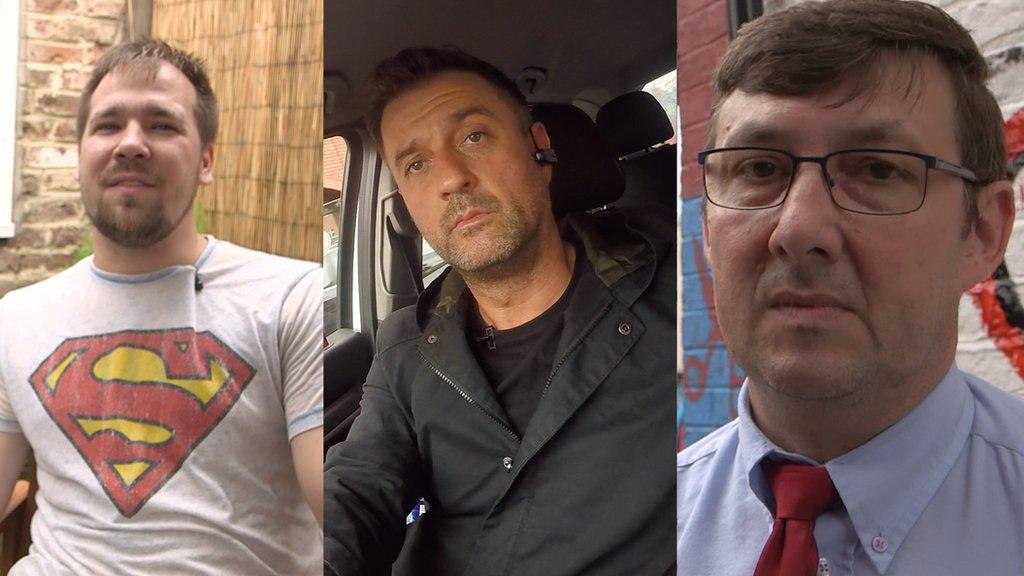In numbers: Has Britain really become more racist?
- Published
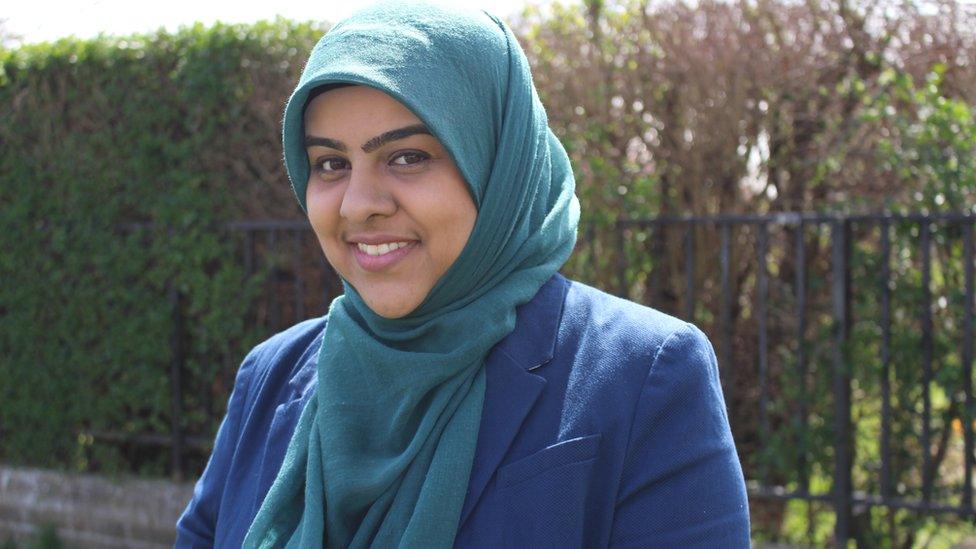
Esmat Jeraj was verbally abused in the street
Hate crime rose sharply after the EU referendum, according to police figures. But is heightened racial tension here to stay?
"Why are you still here?" a customer asked Lithuanian-born Alma Milaseviciute, 31, as she stood at the counter of the cheese shop where she works in Ludlow, Shropshire. "Good luck on your way back," another sneered.
"Get out of my country," yelled a man at Esmat Jeraj, 26, after swearing at her. He'd spotted her wearing a hijab as she walked to work in Whitechapel, east London. Jeraj was born and raised in the UK.
"You speak English, don't you?", a woman in her 60s asked Brazilian-born Danilo Venticinque, 30, at a Southampton bus stop when she overheard him talking to his Mexican wife in Spanish. "Can you understand what I'm saying? This is our country. We are leaving the EU. We will stop having so many people like you over here."
Each of these incidents took place since the referendum on European Union membership. All three victims are at pains to acknowledge the perpetrators represent a minority of Britons and that most people in the UK would be horrified by this behaviour. Prominent Leave campaigners have also strongly condemned abusive and bigoted behaviour of this kind.
But there's clear evidence that there's been a spike in hate crime since the 23 June ballot. Reported hate crime rose by 57% in the four days after the referendum, police say.
There were more than 6,000 reports of hate crime to police between mid-June and mid-July, according to the National Police Chiefs' Council (NPCC).
Cards containing the words "No more Polish Vermin" were distributed in Huntingdon. In Plymouth, a Polish family were the victims of what police believe was a racially-motivated arson attack. Racist graffiti was scrawled on a Polish centre in west London.
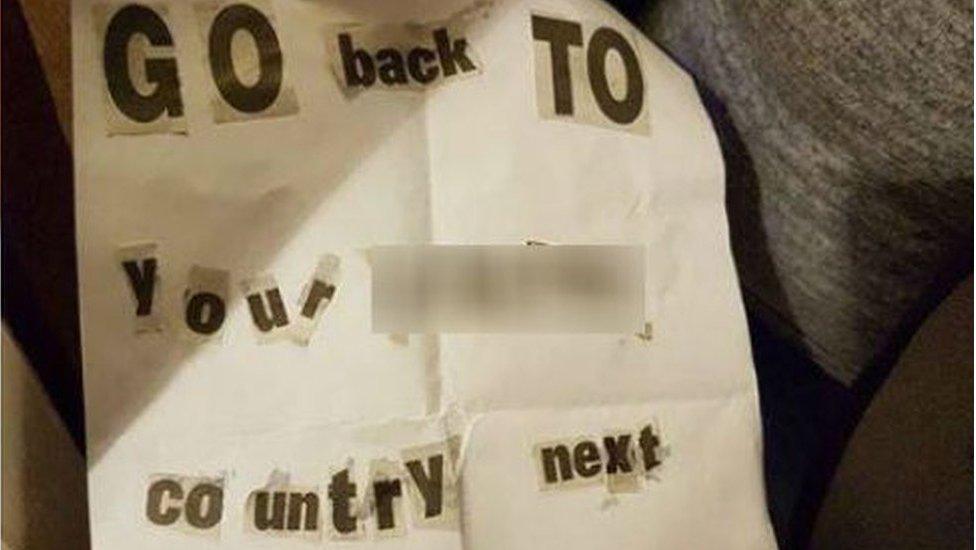
A Polish family in Plymouth received what police described as a "hate-filled" letter
The key question is whether the surge in reported incidents is a blip, or whether the bar for what is considered a typical level of hate crime has been raised. Those who have fallen victim hope it's a temporary wave that will soon subside.
"I think it will calm down," says Milaseviciute. "It was this big thing and everybody was shocked about Brexit." Still, she's decided to stay indoors in the evenings for a while.
Soon after the result, a man who overheard her accent screamed at her in the street: "You are illegal. Everything you do is illegal." It's likely he was emboldened by the result, Milaseviciute believes. But she thinks that with the backlash on social media against racist incidents, people like him are increasingly keeping their thoughts to themselves again.
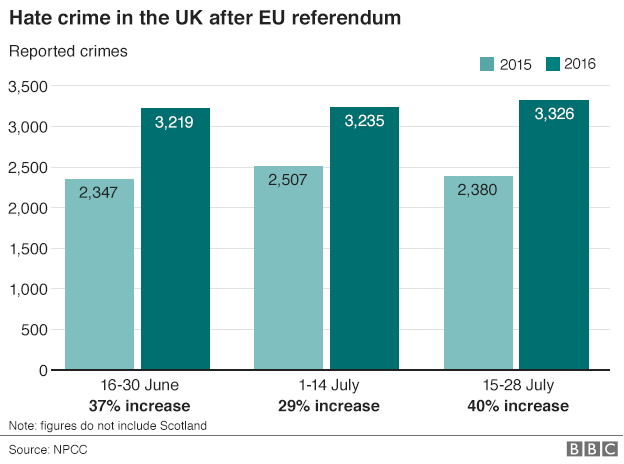
Some 3,219 hate crimes and incidents alleged to have taken place between 16-30 June were reported to police forces across England, Wales and Northern Ireland, according to the NPCC. This represented a 37% increase compared with the same period last year. These figures, published this week, are updates of those previously released - the NPCC says the statistics change over time because of retrospective reporting of crime.
The next reporting period, from 1-14, July, resulted in 3,235 reports of hate crimes and incidents (these figures have also been updated by the NPCC). This was only 0.5% up on the previous fortnight - the previously released statistics had shown a drop - but it was still a 29% increase on the same period in 2015.
And 15-28 July saw 3,236 reports - virtually unchanged on the previous fortnight and up 40% on the same period the previous year. Police Scotland has said, external this rise in reports has not been witnessed north of the border.
So has something permanently changed, or will hate crime levels revert to where they were before?
It's normal for reports of racist and bigoted behaviour to soar after major news events. "Hate crimes don't occur in a vacuum," says Dr Stevie-Jade Hardy, lecturer in hate studies at the University of Leicester.
In May 2013, the month that Fusilier Lee Rigby was murdered, there were 109 anti-Muslim hate crimes on the streets of London, according to, external Tell MAMA, a group which monitors Islamophobic attacks. Prior to this, from April 2012 to April 2013, there were 28 anti-Muslim hate crimes per month on average.
Likewise, there was a record high of 1,179 anti-Semitic incidents in 2014, which the Community Security Trust (CST) attributed, external to reactions to the conflict in Gaza in July and August of that year. Anti-Semitic hate crime also spiked in 2009, when conflict in Gaza also took place.
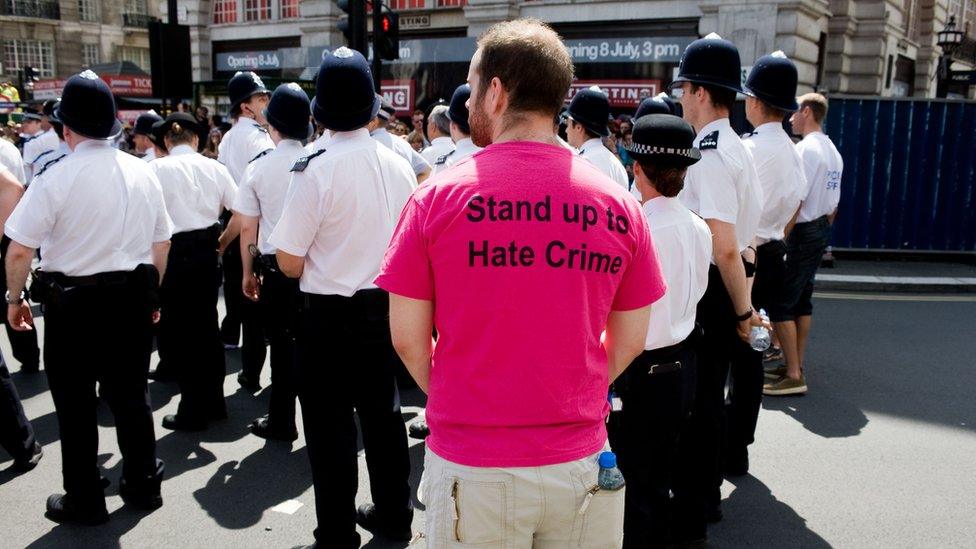
So it's possible that reports of hate crimes will return to normal levels, but there's reason to suspect this won't happen straight away, says Supt Paul Giannasi of the NPCC's Hate Crime Group.
There are a number of reasons for this, he adds. Firstly, Brexit "isn't really over for most people". It still dominates the headlines and will continue to do so for the foreseeable future.
It's also important to remember that the referendum wasn't the only relevant event during this period, he says. Terror attacks took place in Nice and Munich, and the Orlando shootings happened just before, so blaming Brexit exclusively would be simplistic.
There has also been a considerable online backlash against displays of bigotry, which may have helped encourage people to report incidents that might otherwise have gone unrecorded.
With the support of the Institute of Race Relations, the websites Post-Ref Racism, Worrying Signs and iStreetWatch compiled a study, external based on 636 individual reports of incidents of racist and xenophobic hate crime. The reports had been gathered on social media after people were encouraged to share accounts of incidents they had experienced or witnessed.
It's likely campaigns like this made people more likely to report hate crimes to the police, Giannasi says: "I think we are seeing a greater commitment by people who are witnessing things. Most decent people in the country are utterly indignant."
It's impossible to tell to what extent the spike was about a rise in reporting and to what extent it was about a rise in actual incidents. What we do know is that most hate crimes typically go unreported.
Police recorded 52,528 hate crimes in 2014-15 - but the Crime Survey for England and Wales (based on questioning people about their experiences) suggested there were an estimated 222,000 hate crimes on average per year between 2012-13 to 2014-15. This suggests that only around one in four hate crimes are actually reported.
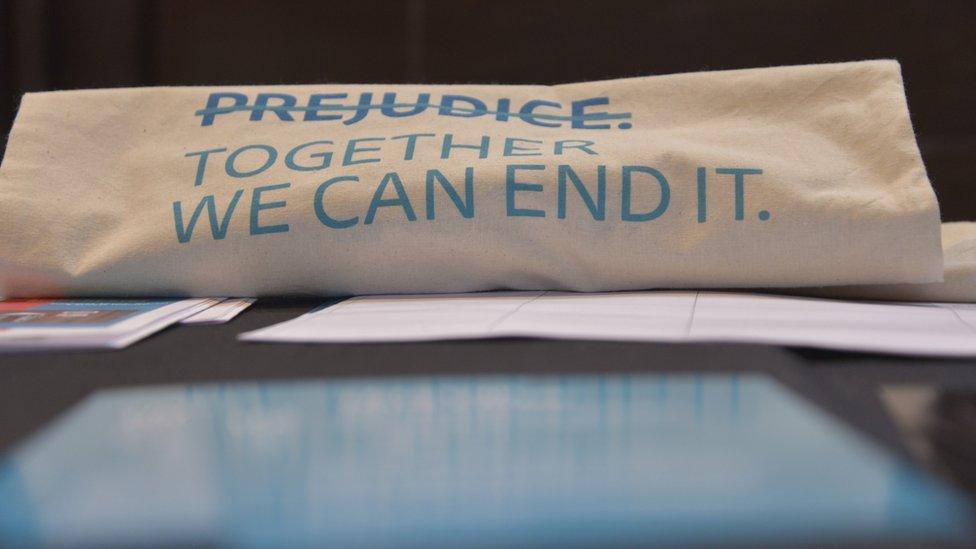
So if the number of reports falls in the weeks ahead, that won't necessarily mean the number of incidents have dropped too, says Hardy. "You are thinking: 'Oh, it's started to subside,' but in reality it might not have," she says. Until the results of the next Crime Survey are released in the autumn, the gap between reporting and levels of victimisation will be unclear.
There's no inevitability that reports of hate crimes and incidents actually will fall. The CST says, external incidents of anti-Semitism were up by 11% in the first six months of 2016 compared with the same period the previous year despite there not having been any obvious "trigger events".
The authorities say they are determined to tackle the problem, however. Police handling of hate crime is to be reviewed following the rise, the home secretary has said, and the government has announced a plan to tackle hate crime in England and Wales. Her Majesty's Inspectorate of Constabulary has been asked to study how forces deal with hate crime.
Victims are waiting to see what kind of impact this has.
"Things seem to have calmed down a little," says Jeraj. "There's been a very strong response to say there's no place for hatred. But I know people who are afraid to leave their house."
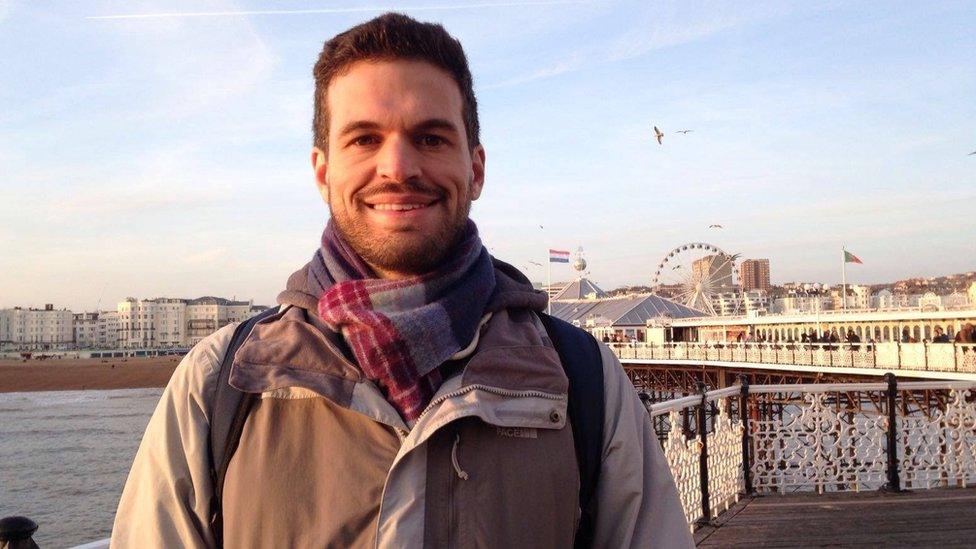
Danilo Venticinque says most Britons reject hate
When Venticinque posted the story of what happened to him on Facebook, he was overwhelmed by the positive response he received from British people. "They told me that I was welcome, that they were ashamed of what had happened," he says.
People like the woman who approached him are, he says, "a minority, but it's a minority that shouldn't feel so confident".
Follow @BBCNewsMagazine, external on Twitter and on Facebook, external
- Published9 August 2016
